First 1000 Days – Building Blocks of Baby Health
It is no child’s play to raise a child. And only a mom can understand how much it takes to take good care of the baby. Eating healthy and having proper nutrition starts from the day when a woman gets to know she is carrying another life inside her womb. The little one is growing at a rapid speed from being just a cell to achieving to forming all of his body organs and taking the human shape. And all of this happening over a period of just nine months. Its essentials that the “Mother to be” is having proper nutrition to suffice his growth needs. The overall growth and development of the baby is very much dependent on those pregnancy days but it doesn’t stop there. The early years of baby’s life are also very crucial as they keep on growing at a fast pace. And like every mother, you want your kid to be fit and fine for the rest of his life, the best you can do is feed him healthy and nutritious food because those First 1000 Days of life are Building Blocks of Baby Health.
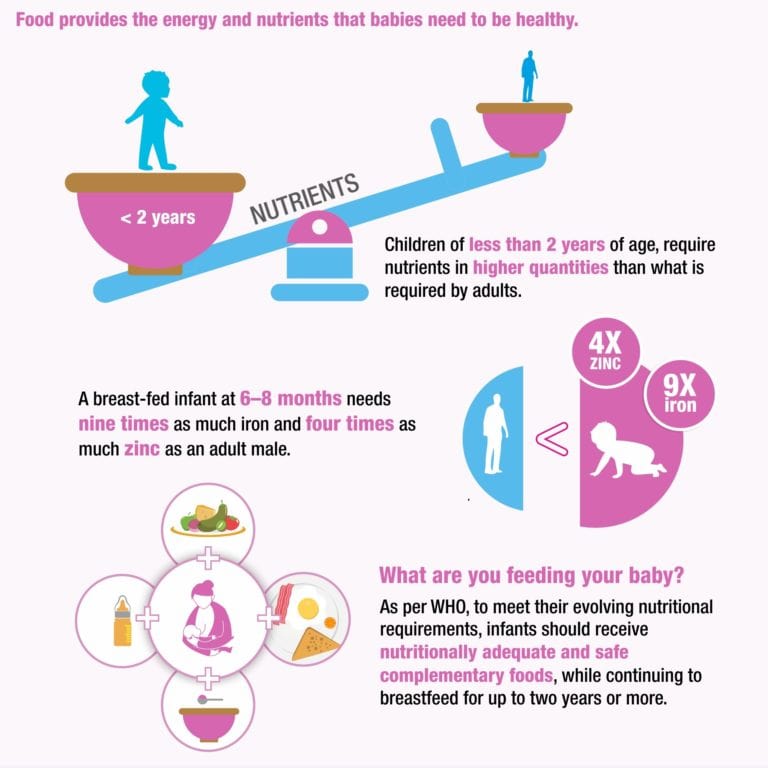
Baby Nutrition Workshop:
Recently, I got a chance to interact with Manjari Chandra, Senior Consultant Nutritionist, Clinical Nutrition, Max Multi Speciality Centre and Founder of Manjari Wellness in a Baby Nutrition workshop whose main focus was nutrition need for first 1000 days (2 years) of baby.It helped me learn more about the infant nutrition and how it impacts their growth.
What are these first 1000 days?
1000 days of baby are calculated by including 270 days of pregnancy and adding 365 days of baby’s first year plus 365 days of your baby’s second year, which will total to the first 1000 days of her life! The concept was conceived by the World Health Organization (WHO) and now doctors and nutritionists all over the world support it.
Why first 1000 Days are Important for baby’s health?
Right Nutrition plays a crucial role in anyone’s life but during these first 1000 days it acts a building block. It will not only impact baby’s lifelong growth, immunity and development but also prevent many serious health issues later in life. Basically, these first 1000 days of Infant Nutrition are the best to secure a healthy future for your baby.
My Journey as a MOM:
I was a first time Mom and barely had any idea on what to feed to baby, thankfully I had my Mom, mother-in-law who guided me a lot here. But not everyone is blessed to have those and even sometimes our elders are not very well aware of the kind of food we should be providing to the baby so that he gets the full nutrition required for his growth.
Pregnancy and Baby’s Birth:
My son is 23 months old now and undoubtedly, I am doting mom. I ate healthy and nutritious food all through my pregnancy so that the baby gets enough nutrition essential for his growth. And that helped me a lot as well during my pregnancy and he was born healthy. But unfortunately, he has born with a TEF-EA condition and had to be operated soon. Well, as the doctors said his weight was the only good thing at that time that helped him survive that major surgery and recover from it later on. Now, he is pretty much healthy and doing almost as good as other kids of his age.
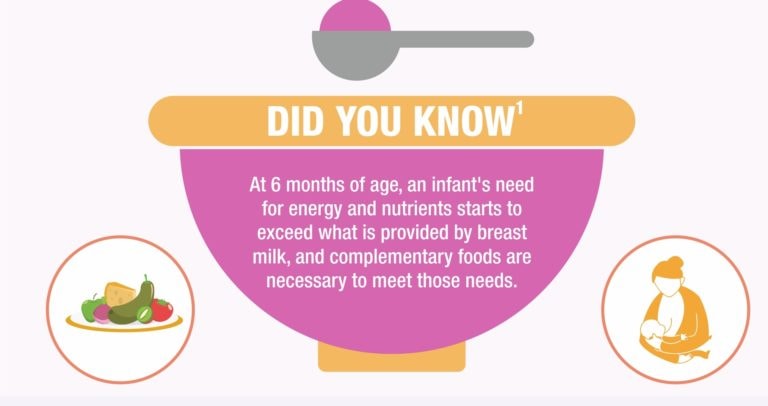
Baby’s First Food – Breast Feed:
New borns are very sensitive to the new environment as their immune system is not fully developed. The best thing for a new born baby is having Colostrum as their first feed. Colostrum is the first milk breasts produce during pregnancy, thick, yellow colored milk. It is full of antibodies with other essential nutrients like proteins, minerals, vitamins, WBC’s which help fight disease-causing agents such as bacteria and viruses. Basically, it acts as immunization of the baby.
Owing to the surgery, my baby couldn’t have his first feed as Colostrum, which already rang an alarm in my head for his health. But I did Breastfed him for first 6 months. Doctors strictly suggest to breastfeed babies under 6 months as the breastmilk will suffice all their nutrients requirements. It is the best food for babies and crucial for their growth and immune system. And to have a good supply of breastmilk, I consumed all the healthy portion of food to provide the nutrients to my baby through my milk.
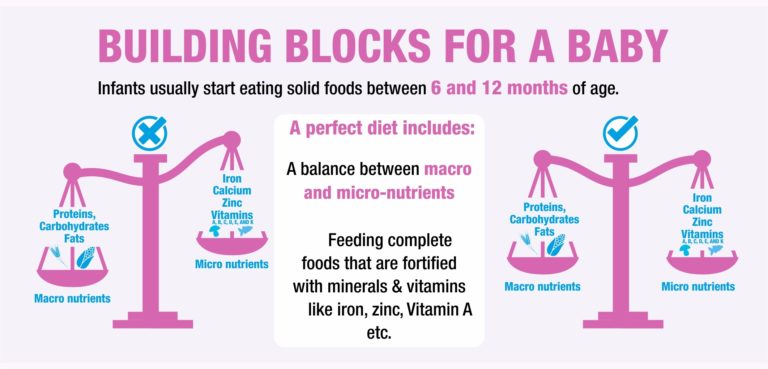
Introducing Semi Solid Food:
So, now the baby is over 6 months old and her little tummy needs more than just the milk. Basically, breast milk needs to be supported by other foods.The babies digestive system is now strong enough to assimilate other food items. Now, that’s where the drill for nutrition starts. While breast milk still continues to provide partial nutrition to your baby, the other foods you give bear the huge responsibility to bridge the gap that breast milk can’t fill.
As the baby is now used to having milk, its difficult for him to start off with solids as well and he might not take more than a few spoonful of food. But, as a parent one needs to be aware that even though he is tiny his nutrition needs are much more than us and we have to supply all the nutrition in those small small meals to support his fast pace growth.
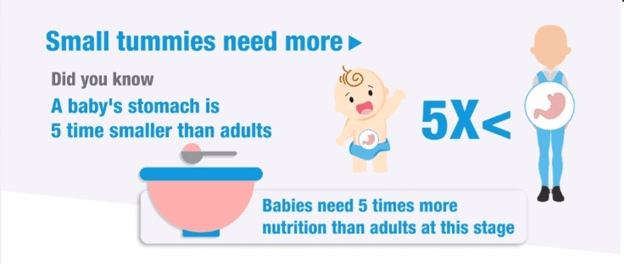
Food Options for 6 to 24 months:
- Water and Fruit Juices: It will be easy to start with liquids. Start with fresh fruit juices which will provide vitamins and minerals to the babys growing needs.
- Mashed Banana and Apple Stew: It is difficult initially to feed fruits to the bay so you can take this route to get these fruits in baby’s food by mashing them and preparing an easy meal for them to relish
- Soups and Lentil Water: Another liquid option to provide nutrients to the baby. As the lentils are rich in proteins, they are essential for his growth.
- Porridge, Rava, Khichdi: Few of the semi sold options that are easy for the baby to adjust his taste buds. Instead of using the grains experiment with the ingredients and try adding more healthy ingredients like Raagi, barley, Pearl Millet (Bajra) and Corns
- Curd, Milk Shakes and Paneer: To add dairy products in baby’s meal other than plain milk, it’s best to prepare milk shakes with the seasonal fruits. A bowl of curd in summers can be best for their digestive system too. Cheese/Paneer is another healthy meal option to fulfill their growing needs.
- Finger Food: Once the bay reaches 1 year milestone, he [refers to have the food in his hands and it’s time to introduce finger food. Give a small portion of Cucumber, carrots or even give them nuts which will soothe their sore gums while help them learn to chew and bite the food
It will take time for you as well as the baby to adopt to these new change in the food palette but slowly thing will turn good as both you start enjoying the food time!
Baby’s Dietary requirements – 6 to 24 months:
In the first 1000 days, your baby grows more than the entire remainder of their life. In the first year alone, a baby’s weight triples and height increases by 50%. What’s more, a staggering 80% of their brain and cognitive development is complete by their second birthday, with their brain size tripling from birth to two years; Babies are born with immature immune systems and it takes up to 2 years to strengthen it.
One needs to understand the baby’s need for this rapid growth and development in order to provide proper nutrition.
Baby needs two kinds of nutrients: macro nutrients and micro nutrients.
- Macro nutrients are responsible for providing energy and aid physical growth and development that we can see with our eyes. For example, proteins, carbohydrates and fats.
- Micronutrients are essential for developments that you can’t see and are developing within the baby like the brain and immunity growth. Vitamins and minerals are micronutrients. Iron, zinc, vitamin A for example, aid in brain development and immunity.
Typical diet plan for an average a two-year baby:
- 1 egg
- 500-800 ml dairy (milk, cheese, paneer, curd, buttermilk)
- 2 servings ( 150 ml cooked, each) Beans/Pulses/ lobia/lentil etc
- 3 servings ( 150 gms cooked each) Cereals and Grains
- 3 servings ( 150 gm each) vegetables and fruits
- 1 serving of fortified cereals
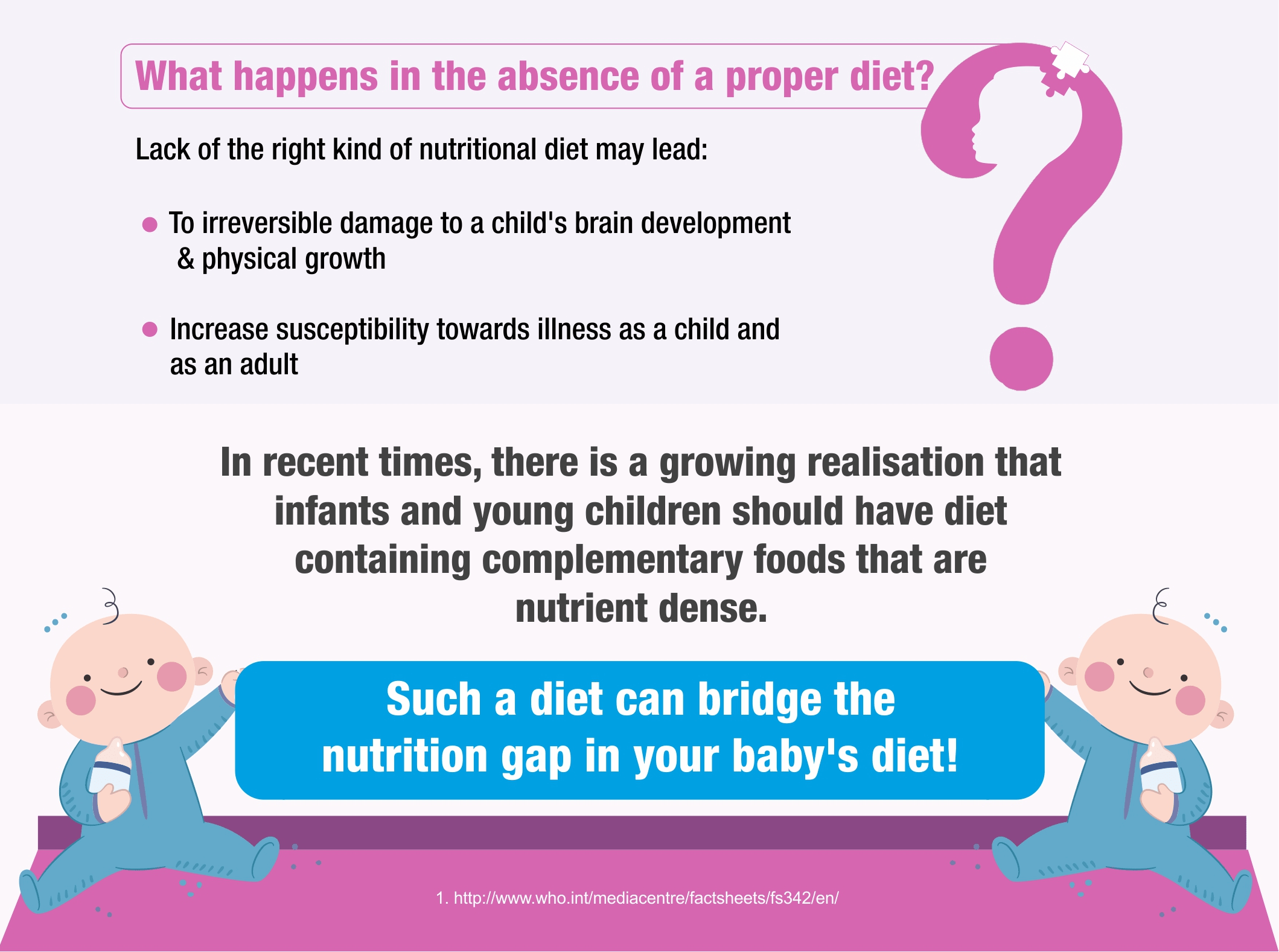
Conclusion: There are changes you can see, and changes that you can’t. But one thing is clear that your baby needs a whole lot of nutrition during this time, more so than at any other time in their life. What your baby eats in the first two years, determines your baby’s potential for the rest of their life! The right kinds of food have the power to ensure that the baby reaches their full potential when it comes to physical growth, learning capacity and strong immune system. Provide baby with complete nutrition during these first 1000 days and your needn’t worry for the rest of the life.


